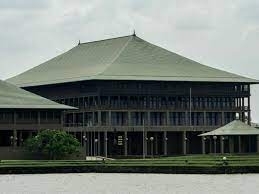Parliamentary system : womb of racism , separatism & civil war :-portal for Lanka's fall

President Gotabaya Rajapaksa has invited all parties to join an all-parties government. He will have few takers and those few takers will wreck whatever’s left of their reputations by serving under him, when the people want him gone.
The President toys with possible solutions without grasping that he is, in the public perception, The Problem. Those in the SLPP and Group of 40 (G-40) who play this game together with him don’t seem to understand that either.
The G-40 and SLPP don’t grasp that even if President GR appoints an interim or all-parties government, he can dissolve it the next day, so long as he retains the powers of the 20th Amendment. Therefore, logically, any interim administration has to be either a post-GR government or at the least a post -20A government.
President GR isn’t the only one who doesn’t get it. Many politicians and commentators raise ridiculous questions such as “if we throw out the President or the government, what will be next?”. They don’t understand that the answer to the question what comes next, actually comes next—by which I mean it is open-ended and belongs to the next stage of the process of struggle.
Another question is “who is the leader of the struggle?’ Did anyone know who the leader of the Occupy Movement in the USA was?
What about one of the most influential struggles of the post-Cold War era, that of the Zapatistas of Mexico? All that the world knew about its leadership was that there was a guy in a ski mask and smoking a pipe, who called himself Sub-comandante Marcos, wore two wristwatches, and wrote and talked like a combination of Gabriel Garcia Marquez and Eduardo Galeano. It took a decade -and-half for it to be known that he had been a professor of philosophy at the region’s main university.
The Sinhala Only policy of 1956, which Lee Kuan Yew always identified as the island’s original sin, was promulgated under a parliamentary system.
The Bandaranaike-Chelvanayakam Pact of 1957 was abrogated under a parliamentary system, though SWRD may not have done so had he been the elected President instead.
The proficiency exams in the public sector, the change in the medium of instruction in schools, and the schools take-over all took place under the parliamentary system.
The universal system of weekend holidays on Saturdays and Sundays was substituted by pre-Poya and Poya, under the parliamentary system.
The policy of district-wise and media-wise standardization of entrance to the university took place under the parliamentary system.
The state takeover of Lake House took place under the parliamentary system.
The rise of the JVP, the first insurrection of April 1971 and its bloody suppression took place under the parliamentary system.
The abolition of the independent Public Service Commission and the subordination of state administration to politicians, took place under the parliamentary system.
The constitutional status of Sinhala only and the formal accordance of primacy of place to the biggest one of the island’s many religions took place under the parliamentary system.
The birth of the Tamil New Tigers (TNT) in 1972 and of the Liberation Tigers of Tamil Eelam (LTTE) in 1976, as well as the first acts of lethal violence, took place under the parliamentary system.
The adoption of the separatist Vadukkodai resolution by the democratic Tamil mainstream took place in 1976 under the parliamentary system.
This system, under which the worst policies were adopted, policies which derailed and wrecked this country’s prospects, is the very one the liberal-democratic Opposition is committed to restoring.
By contrast, the re-enfranchisement of the hill-country people of recent Indian origin took place under the presidential system.
The 13th amendment making for provincial devolution was adopted under a presidential system.
The electoral system of proportional representation was adopted under the presidential system.
The 200 garment factories program and Janasaviya were enacted under the presidential system.
This is the system the liberal-democratic Opposition is now committed to scrapping.
Surely a nationally and directly elected presidency is closer in spirit to a republican democracy and a far better channel of popular sovereignty, than a parliamentary system?
Surely a presidential system with the separation of powers, making for checks-and-balances is the Middle Path between the present-day hyper-centralized autocratic presidency on the one hand, and a purely parliamentary system which privileges parochial interests and makes for majoritarianism, on the other?
